UK
The Guardian
Sun 15 Dec 2019
What we learned about the media this election
The campaign saw an unprecedented level of criticism of British journalism
“While audiences of 20-somethings have largely abandoned television news altogether, BBC bulletins remain important for reaching older viewers who are more likely to back the Tories. And while print newspaper sales are collapsing and online news audiences growing, right-wing tabloids which relentlessly backed the Conservatives still sell millions of copies a day – and often indirectly help to set the agenda on television, radio, and online. Although it will be months before academic studies drill down in to the results, there remains a simple demographic divide on how people across the political spectrum get their news.
Ahead of the election there were concerns about foreign manipulation of the electoral process. Although there were some issues – the prime minister refused to let a report into Russian money be released pre-election, and Reddit suggested a Russian-linked account may have helped distribute leaked US-UK trade papers – ordinary, politicised Britons proved more than capable of creating their own fake posts.
Online audiences are so fragmented that information can reach millions of people without ever being seen by journalists or political campaigns.
The 2016 EU referendum and DT’s victory in the US presidential election focussed minds on the idea of under-the-radar, paid-for ‘dark ads’ which manipulate small groups of people to vote a certain way. But transparency tools introduced by Facebook and Google, although flawed, made this easier to track.
They suggested political advertising in the UK is drifting towards the US model, with blanket ad buys on sites such as YouTube resembling television advertising designed to carpet-bomb voters with simple messages, rather than the more laborious task of manipulating small groups below the radar.
It was the election where politicians realised they could attack the media with few downsides. Boris Johnson’s decision to skip a one-on-one primetime television interview with Andrew Neil provoked fury from Labour, especially after they had agreed to put Corbyn up for scrutiny. But Tory strategists decided – apparently correctly – that a tough interview with Neil could be substantially more damaging than a few stories about Johnson refusing to take part in a television programme. The real concern, according to Tory campaign insiders, was about clips from the interview going viral.”
DT administration toys with avoiding future presidential debates completely. [Newsweek ‘DT said he would consider skipping any presidential debates related to the 2020 election in a tweet posted on 12.11.19.]”
[Guardian full article]

Leave a Reply